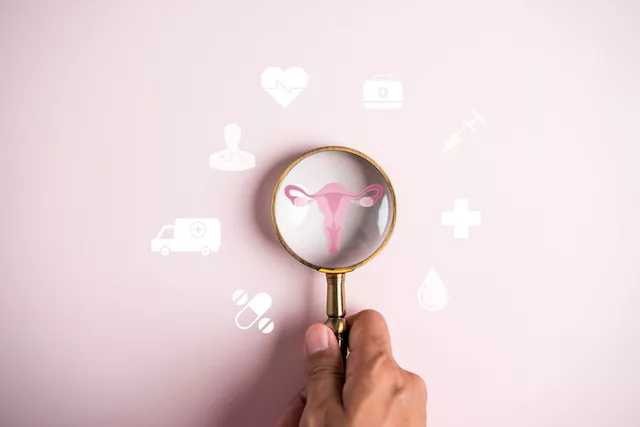
Not only do women have to deal with menstruation, but now there is phantom menstruation. For many women, being able to predict their period is an essential aspect of their monthly planning routine. Whether it’s for family planning or figuring out if we need to pack tampons for the holidays (VIP detail), having a regular period can be an important time marker.
However, more and more women are reporting what is unofficially called a “phantom period”—that is, they are experiencing the signs of an upcoming period, but the period itself never comes. What does this strange phenomenon mean for your health? We’re finding out the possible causes of having cramps but no period and what you should do about it.

What is a ghost period?
During your period, the lining of the uterus, known as the endometrium, sheds (as long as you are not pregnant). This process is part of the menstrual cycle, which is a regular monthly series of changes that occur in a woman’s body in preparation for the possibility of pregnancy. At least, this is what happens during the normal and expected process of having a period.
On the other hand, the ghost period is described as having practically all the symptoms of premenstrual syndrome without the period itself. Many women report experiencing things they would normally expect before menstruation occurs, such as:
- Electric shock
- breast tenderness
- Cravings
- swelling
- Irritability and other mood swings.
In other words, there is every reason to believe that Aunt Flo will be coming to town that month. But for some reason, she ends up passing you by, leaving you confused, upset, and maybe worried.
Possible reasons behind having cramps but no period, the phantom period
Okay, so you have cramps but no period. What gives? According to women’s health experts, a few things could be happening.
It is important to get to the bottom of recurrent irregular periods, as the menstrual cycle is considered the “fifth vital sign” to assess the woman’s health, along with blood pressure, body temperature, heart rate and respiratory rate. The most likely underlying culprits of phantom periods may be physical, psychological, or both.
Physical causes
Your period is a complicated dance of hormonal fluctuations that tell your body what to do each month. But if something is interrupting the flow of things, then it can literally interrupt the flow of things. Some of the underlying physical triggers of a phantom period may include:
Lack of ovulation
Non-ovulation, a condition known as anovulation, can explain the presence of period-like symptoms without actual menstrual bleeding occurring. During ovulation, an egg is released from the ovary, which is followed by other phases of the menstrual cycle, such as the production of estrogen and progesterone. However, when ovulation does not occur, this can cause hormonal imbalances that appear as symptoms of the period without bleeding.
Hysterectomy with ovarian preservation
Women undergo hysterectomies for several reasons. An ovarian-sparing hysterectomy involves the surgical removal of the uterus while leaving the ovaries intact. The uterus is responsible for menstruation, so when you don’t have one, you will no longer have your period. However, when the ovaries are preserved, hormonal function continues, so menopause does not begin immediately. This explains why you may have similar symptoms without your period.
Effects of hormonal medications
The use of birth control in the form of intrauterine devices (IUD) or oral contraceptives can lead to irregular period when you start using them for the first time. Irregular levels or imbalances of estradiol and progesterone can cause a lack of ovulation and therefore a missed period, despite other symptoms.

PCOS
Polycystic ovary syndrome (PCOS) is a hormonal disorder characterized by an excess of androgens (male hormones) such as testosterone and often involves insulin resistance. He hormonal imbalances Associated with PCOS can cause period-like symptoms without the typical menstrual bleeding.
endometriosis
Endometriosis is a condition in which tissue similar to the lining of the uterus (endometrium) grows outside the uterus. Although the main symptom of endometriosis is pelvic pain, it can also cause symptoms similar to those of periods, but without bleeding.
Perimenopause hormonal changes
If you’re approaching perimenopause, your missed period may be a sign that your hormones are starting to shift in that direction. During perimenopause, estrogen levels can rise and fall irregularly, causing changes in the menstrual cycle.
Progesterone, another hormone involved in the menstrual cycle, can also become erratic. The ratio between estrogen and progesterone becomes unbalanced, contributing to irregular periods.

Eating disorders
Eating disorders such as anorexia nervosa or bulimia can have significant effects on hormonal balance. Changes in body weight and nutritional status can alter reproductive function, potentially causing period-related symptoms, even if menstruation is late. irregular or absent.
The pregnancy
Pregnancy can cause all kinds of strange symptoms, especially at the beginning. Also, you won’t get a period if you’re pregnant. Hormonal changes associated with pregnancy, particularly the presence of hCG (human chorionic gonadotropin), prevent the drop in progesterone levels that would normally cause menstruation.
This hormonal environment helps maintain the uterine lining and supports the conditions necessary for the successful development of the embryo and fetus. If you think you might be pregnant, get a test to confirm it.
Psychological causes
It should come as no surprise that we are living in a high-stress time that seems to value busyness and full schedules. This way of life can take a heavy mental and emotional toll. The mind is a powerful thing. Uncontrolled chronic stress, anxiety and depression can ultimately affect Physiological processes such as menstruation.
Stress and anxiety
High levels of stress and anxiety can affect your endocrine system, including the release of hormones that regulate the menstrual cycle. Chronic stress can cause irregularities in ovulation and the menstrual cycle. This could cause symptoms such as bloating, cramping, and breast tenderness without actual menstruation.
Emotional distress or depression
Grief, trauma, or major life changes can disrupt the regularity of the menstrual cycle. Depression and emotional turmoil can affect hormonal balance and cause period-like symptoms.
To do
When you are experiencing a phantom period, it is first important not to panic. Missing a period or experiencing irregular periods from time to time is not uncommon for most women. If it continues, further excavation may be warranted.
First of all, if you may be pregnant, it makes sense to take a pregnancy test. If that confirms that she is not pregnant, then it is a good idea to talk to her healthcare provider, especially if she continues to experience phantom periods in the following months.
There could be several underlying factors involved, such as the physical and psychological triggers discussed above, as well as possible endocrine conditions consider. Your provider can help you evaluate what might be contributing to your phantom periods.
Lifestyle modifications
In the meantime, there are things you can do as part of your daily routine to help improve your reproductive health and menstrual regularity. Consider the following ideas:
- Practice stress management. Things like yoga, stretching, mindful meditation, journaling, art, walks in nature, and listening to relaxing music can help relieve stress and prevent it from building up.
- Seek mental health support. Therapy can be an invaluable tool in overcoming emotional distress, anxiety, depression, and grief that can manifest in physical symptoms. Leaning on your community is also great, but professional therapists can help you make sustainable changes to support your mental well-being.
- Eat a healthy diet. Eat a nutrient-dense diet that emphasizes fruits, vegetables, whole grains, legumes, nuts, seeds, and lean proteins (and minimize added sugars and processed meats) is one of the best things you can do for your health. These foods provide a variety of vitamins, minerals, fiber, and antioxidants that help you thrive and support you. management of premenstrual symptoms and regularity.
- Move your body. Regular exercise is important for reproductive and general health. Although the mechanisms are not well understood, physical activity has Metabolic and hormonal benefits. which are likely to support a healthy menstrual cycle.
- Supplement. Adding certain supplements to your daily routine is an easy way to help support menstrual health. For example, HUM Private Party® is a potent vaginal probiotic + cranberry supplement to help balance the vaginal microbiome and promote optimal urinary tract function. Another option is HUM SOS PMS gummies, which combine clinically proven chasteberry extract, agnusids, vitamin B6, and cranberry to relieve PMS symptoms, achieve healthy hormonal balance, and improve urinary tract health.
Ghost Period Takeaways
Talking about our menstruation is no longer taboo, fortunately. With more and more women reporting phantom periods, it helps normalize talking about the abnormalities that many of us experience in any given month. While occasionally missing your period is not uncommon, that doesn’t mean it’s not worth investigating.
If you continue to have phantom periods, there could be many factors involved. First confirm that you are not pregnant, consult with your healthcare provider, and be sure to incorporate everyday lifestyle habits that support menstrual regularity and overall health.







